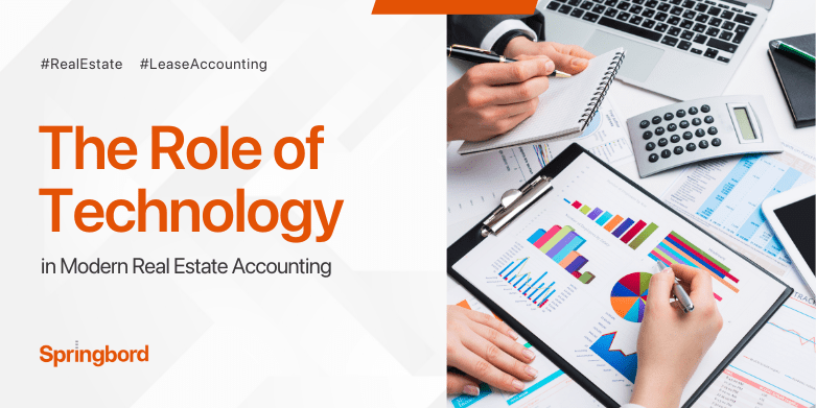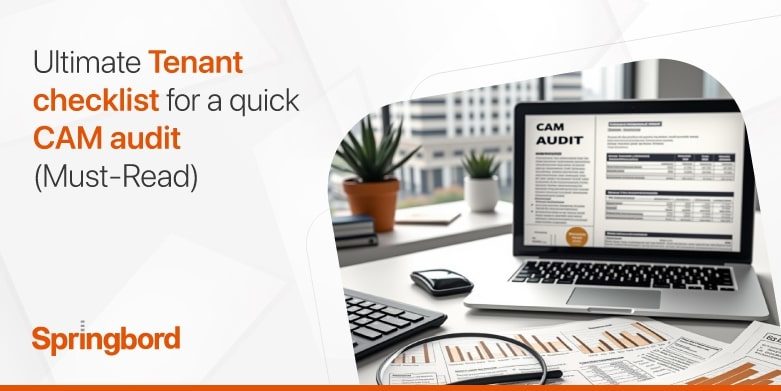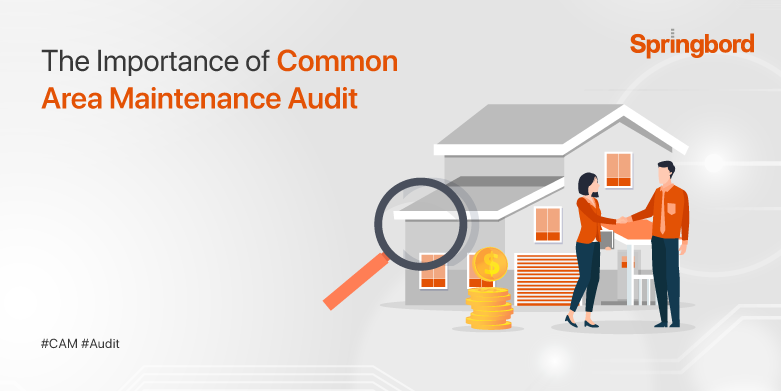 Read time 9 min
Read time 9 minReal estate accounting is essential for administering the financial aspects of the continually expanding real estate industry. Technology has become an indispensable instrument for revolutionizing real estate accounting in the contemporary environment.
Technology has significantly improved real estate accounting processes’ efficacy, precision, and openness with sophisticated software systems, automation, and data analytics.
In this article, we will examine the multifaceted role of technology in contemporary real estate accounting, focusing on its impact on refining financial processes, improving reporting and analysis, managing risks and compliance, and facilitating collaboration and communication.
Streamlining Financial Processes
Real estate accounting relies heavily on the effective administration of income, expenditures, and general financial operations, all of which can be improved through streamlining financial procedures.
In this respect, technology has played a revolutionary role, replacing laborious manual processes with seamless automation, seamless integration, and effective tracking.
- Automation of data entry and reconciliation: One of the biggest obstacles in real estate accounting is the massive amounts of data that must be analyzed, documented, and reconciled. Inaccuracies and delays in financial reporting are inevitable results of manual data entry’s inefficiency.
However, technological advancements have enabled the development of automated data entry and reconciliation solutions, vastly improving the reliability and efficacy of these tasks.
Today’s real estate accounting software features can automatically enter data from documents like bank statements, invoices, and receipts. Optical character recognition (OCR) technology may automatically retrieve data from scanned documents, which negates the need for human intervention.
By eliminating the need for manual data entry, accountants save the time and energy they may put towards more high-level projects.
Furthermore, technology has tremendously simplified reconciliation, an essential part of real estate accounting.
Reconciliation software automatically compares financial records and bank statements to reveal any inconsistencies and allow for prompt resolution. This strengthens the reliability of accounting by guaranteeing that all financial data is correct and up-to-date.
- Integration of accounting software with property management systems: In real estate accounting, integrating financial data with property management systems is crucial for efficiently tracking and administrating income and expenses.
The manual transmission of data between systems made this integration a time-consuming and error-prone process in the past. However, technological advancements have enabled accounting software and property management systems to work harmoniously, streamlining financial processes.
Rental income, utility expenses, maintenance costs, and lease agreements are critical financial data that may be automatically imported into modern real estate accounting software via integration with property management systems.
Thanks to this streamlined process, there will be no more double- or triple-entering of data. Financial records can be synchronized in real-time, guaranteeing accuracy and completeness.
Real estate accountants may get a birds-eye perspective of the property portfolio with the click of a button thanks to integrated technologies that make it simple to generate in-depth financial reports.
This gives them the ability to assess the profitability of individual properties as well as the overall portfolio. Insights like these help real estate companies plan and make decisions that are good for their bottom line.
- Efficient tracking of income and expenses: Accurately tracking income and expenses is paramount in real estate accounting, as it directly impacts financial performance evaluation, budgeting, and tax compliance. The tracking method has been greatly simplified and improved using cutting-edge technological technologies.
Income and expenditures can be broken down further and organized in real estate accounting software by user-specified criteria. This guarantees exact and consistent record-keeping of monetary dealings.
Bank feeds that are automated upload transaction information directly from bank accounts into the accounting software, significantly reducing the amount of manual data entry required.
Additionally, accountants and property managers now have access to real-time financial data thanks to smartphone apps. These programs make mobile invoicing, receipt scanning, and transaction recording possible.
This kind of portability and adaptability not only boosts productivity but also lessens the possibility of lost data or stalled bookkeeping.
Enhanced Reporting and Analysis
Enhanced reporting and analysis are crucial to modern real estate accounting, enabling stakeholders to gain valuable insights into financial performance, make informed decisions, and drive business growth.
Developing cutting-edge reporting tools, real-time financial insights, data visualization methods, and up-to-date information have all contributed to technology’s revolutionary impact on the industry.
- Utilization of advanced reporting tools: Modern technology has enabled many advanced reporting tools, which real estate accountants can use to create in-depth, personalized, and aesthetically pleasing reports. Data collection, analysis, and report preparation are all simplified and made more reliable with the help of these programs.
Various pre-made report templates meet the needs of the real estate business in accounting software. Profit, loss, cash flow, occupancy rates, and return on investment are only a few of the leading financial parameters covered by these templates.
By adjusting the parameters, date ranges, and attributes, accountants may quickly and easily create reports tailored to their unique needs.
Accounting professionals can delve further into particular financial issues or conduct in-depth studies with the help of ad hoc reports generated by sophisticated reporting technologies.
They can explore income streams, spending categories, property performance, or tenant leasing data using filters, drill-down features, and data segmentation.
- Real-time financial insights and data visualization: Insights into the financial health of real estate investments in real-time and the ability to visualize that data are made possible by technological advancements in finance.
Property management systems, bank feeds, and market data are just some sources that real estate accounting software may link with to deliver timely financials.
Property owners, investors, and asset managers may better track key performance indicators (KPIs) and respond quickly to changing market conditions when they can access real-time financial analytics. Revenue, expenses, and profits may be monitored in near real-time, allowing for rapid problem-solving and opportunity seizing.
Financial analysis is greatly aided by data visualization. The financial data stored in real estate accounting software is visualized through interactive dashboards, charts, graphs, and heat maps. Information is made easier to understand, and trends, correlations, and anomalies can be spotted with the help of these visualizations.
- Improved decision-making based on accurate and timely information: The availability of accurate and timely financial information profoundly impacts decision-making in real estate accounting. Technology reliably updates data, eliminating the need for time-consuming and error-prone human procedures.
Thanks to modern reporting systems, stakeholders can make better decisions based on timely and accurate financial data. Investment prospects, property performance, and market rents can all be evaluated so property owners can make informed decisions.
The performance of investments can be tracked, underperforming holdings might be identified, and capital could be allocated more efficiently.
Risk Management and Compliance
Regarding real estate accounting, risk management, and compliance play crucial roles in protecting the honesty and safety of financial dealings.
Real estate professionals may more accurately identify risks, develop safe and transparent transaction systems, and guarantee adherence to industry norms and accounting standards thanks to technological advancements.
- Integration of technology for risk assessment and mitigation: Technology’s novel tools and software solutions have allowed real estate professionals to recognize, evaluate, and reduce dangers to their financial operations.
By streamlining and standardizing the risk assessment process, these technologies contribute to an all-encompassing and systematic strategy for handling risks.
The risk assessment modules built into real estate accounting software help accountants see dangers in areas diverse as cash flow, debt management, market volatility, and leasing agreements.
The software can generate risk profiles, regions of vulnerability, and prioritized risk mitigation plans when the appropriate data and settings have been inputted.
Moreover, technological advancements have made it possible to monitor risks in real-time and receive notifications whenever something potentially dangerous occurs.
Unusual transactions, spending patterns, or breaches in internal controls can be spotted by automated systems, which immediately alert the proper parties. This allows for preventative measures to be taken or errors to be fixed before they cause significant financial harm.
- Implementation of secure and transparent transaction systems: To preserve confidence and reduce fraud threats, creating safe and transparent transaction systems is essential, as real estate transactions typically involve large sums of money.
Secure platforms, like blockchain and cloud-based solutions, have revolutionized transaction systems by increasing security, transparency, and efficiency.
Blockchain’s distributed and immutable ledger makes recording financial transactions verifiable and challenging to alter. By automating and enforcing contractual requirements, smart contracts implemented on blockchain systems reduce the possibility of fraud or disputes.
These safe transaction technologies leave a paper trail that can be verified by all parties involved, which boosts trust and eliminates the need for middlemen.
Cloud-based systems have also revolutionized the transaction process by providing a central location for storing and exchanging financial records.
There is no longer any need for real estate agents to worry about the loss or theft of paper documents, thanks to cloud storage for everything from contracts to financial records. This enhances operational efficiency by standardizing document handling and reducing the complexity of due diligence procedures.
- Compliance with industry regulations and accounting standards: International Financial Reporting Standards (IFRS) and Generally Accepted Accounting Principles (GAAP) are two examples of the industry norms and standards to which real estate accounting must adhere.
Financial openness, correctness, and legality depend on following these rules. Processes for complying with these regulations have been simplified thanks to technological advancements.
Compliance elements that are in line with industry norms and accounting standards are typically found in real estate accounting software.
Accurate financial reporting and a decreased chance of noncompliance result from the accounting rules application automation features. The software can generate balance sheets, revenue statements, and cash flow statements that meet government standards.
Collaboration and Communication
Collaboration and communication are vital to effective real estate accounting, enabling seamless coordination between stakeholders, facilitating information exchange, and promoting efficient decision-making.
Accounting, property management, investor communication, and real-time collaboration for financial planning and budgeting have all been revolutionized by technological advancements that provide centralized platforms for accessing financial data.
- Centralized platforms for stakeholders to access financial data: Real estate accounting has historically relied on manual processes, such as exchanging physical papers or transmitting files via email, to allow for the access and sharing of financial data among stakeholders.
This increased the likelihood of data loss or theft and caused delays and inefficiencies. The introduction of centralized platforms that facilitate access to financial data has been made possible by technological advancements, allowing for safe and productive teamwork.
Thanks to cloud-based platforms provided by real estate accounting software, owners, accountants, managers, and investors can get their hands on financial data whenever and wherever they need it.
These systems have robust user authentication, allowing for granular control over who has access based on their specific roles and responsibilities.
When stored in one location, stakeholders have better access to important financial documents like financial statements, transaction records, lease agreements, and expense reports. This helps everyone involved in real estate operations see things, make better decisions, and work together.
- Seamless communication between accountants, property managers, and investors: Successful real estate accounting depends on open lines of communication among accountants, property managers, and investors.
Accountants, property managers, and investors can now all stay in constant contact with one another thanks to modern technology, which facilitates the prompt transmission of information, the explanation of financial concerns, and the joint making of decisions.
Communication tools like chat rooms, message boards, and push notifications are built into real estate accounting software.
Stakeholders can now have one-on-one conversations rather than relying on sporadic phone calls or email threads. It is simple for accountants to contact property managers to ask questions about expenses, resolve disputes, or obtain further financial data.
Direct connection between investors and accountants/property managers allows investors to get financial performance updates, ask questions, and give directions for managing their portfolios. As a result, there is less room for misunderstandings and more opportunity for stakeholders to work together to achieve their financial goals.
- Real-time collaboration for financial planning and budgeting: Financial planning and budgeting are essential components of real estate accounting that necessitate close coordination between a wide range of parties in real time.
As a result of technological advancements, we now have access to real-time collaboration tools that facilitate communication, knowledge sharing, and the development of sound financial strategies among all parties involved.
Financial planners, property managers, and investors can all work together with the help of real estate accounting software’s collaborative capabilities.
Without the need for time-consuming back-and-forth exchanges or version control difficulties, they may work together on revenue projections, expense forecasts, capital expenditure plans, and cash flow management in real time.
Within the same platform, users may collaborate on strategic decisions, view real-time updates to financial data, and share their thoughts in real time.
This helps everyone involved see things, improves accuracy, and shortens the time to reach an agreement. It also simplifies budgeting and planning for the future, so businesses can respond quickly to shifting markets and priorities.
To Sum Up
The role of technology in modern real estate accounting is undeniable, revolutionizing the way financial processes are streamlined, reporting and analysis are conducted, risk management is handled, and collaboration is facilitated. As businesses in the real estate industry seek efficiency, precision, and expansion, it becomes essential for them to adopt the technology.
Springbord, a prominent global information service provider, offers customized data solutions and outsourcing services that can drastically reduce costs, increase productivity, and stimulate business expansion.
Springbord is a valuable partner for real estate accounting professionals who wish to leverage the power of technology in their operations, thanks to their expertise, intelligent tools, and cutting-edge technology.







